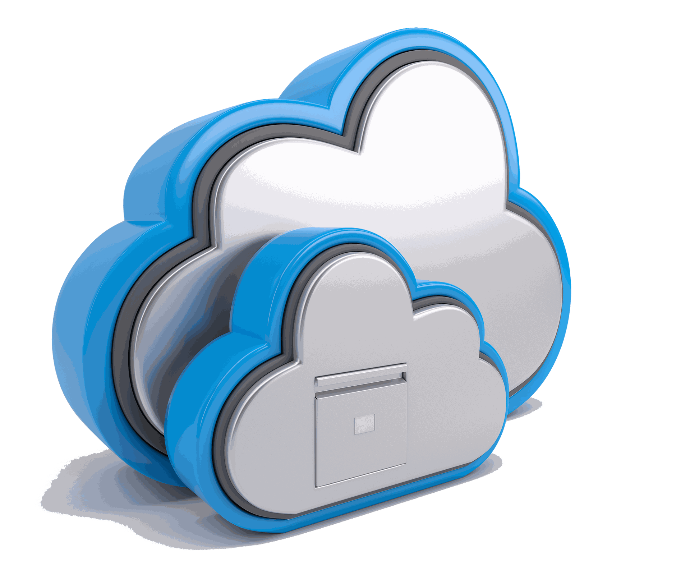Cloud-based storage services have revolutionized the way businesses, both small and large, manage their data. The term "cloud-based storage" encompasses a range of solutions that provide file storage and backup services through remote servers accessible over the internet. In this comprehensive article, we will explore what cloud services are, the various types available, their applications, and the advantages they offer over traditional methods.
What Are Cloud Services?
Cloud services refer to a collection of computing resources, including storage, processing power, and applications, that are delivered over the internet. These services are hosted on remote servers and can be accessed and managed through web browsers or dedicated applications. Cloud services eliminate the need for organizations to invest in and maintain their physical infrastructure, offering a scalable and cost-effective solution.
Unveiling the Essence of Cloud-Based Web Servers
A cloud-based web server represents a dynamic evolution in the realm of digital infrastructure. In essence, cloud servers are virtual entities, distinct from physical counterparts, residing within a cloud computing environment. These virtual servers boast the unique capability of on-demand accessibility, accommodating an unlimited number of users. Functionally akin to their physical counterparts, cloud servers excel in tasks such as data storage and application execution.
The distinctive feature of cloud servers lies in their virtual nature, liberating users from the constraints of physical hardware. This liberality enables swift scalability, responding to fluctuating demands with unparalleled agility. Cloud-based web servers offer a flexible and efficient solution for tasks ranging from storing extensive datasets to running complex applications.
In essence, the paradigm of cloud-based web servers redefines the landscape of digital hosting, embodying flexibility, accessibility, and performance. As organizations increasingly embrace the transformative potential of cloud computing, the concept of cloud-based web servers emerges as a cornerstone, symbolizing a progressive shift toward a more adaptive and scalable digital infrastructure.
Types of Cloud Services
1. Cloud Storage Services
Cloud storage services provide remote storage space where users can store and retrieve their files. These services, such as Google Drive, Dropbox, and Microsoft OneDrive, offer seamless access to data from any device with an internet connection. They often come with features like file synchronization, sharing, and version control.

2. Cloud Backup
Cloud backup involves copying and storing data from local systems to an off-site server. This ensures data recovery in case of local failures, disasters, or accidental deletions. Businesses use cloud backup solutions to protect critical information and maintain continuity in the face of unforeseen events.
3. Cloud Platform
A cloud platform provides a comprehensive environment for developing, testing, and deploying applications. Platforms like Amazon Web Services (AWS) and Microsoft Azure offer a range of services, including computing power, storage, and databases, facilitating the entire application lifecycle.
4. Cloud Hosting Providers
Cloud hosting providers offer virtualized computing resources, allowing businesses to host websites and applications without the need for physical servers. This results in increased flexibility, scalability, and reduced infrastructure costs.
5. Multicloud Management Platform
Multicloud management platforms enable organizations to oversee and control their operations across multiple cloud environments. This helps optimize performance, enhance security, and prevent vendor lock-in.
Advantages of Cloud-Based Storage
Flexibility and Scalability: Cloud services can scale resources up or down based on demand, providing flexibility that traditional methods lack.
Cost Efficiency: Organizations can reduce capital expenses by paying for only the resources they use, avoiding the need for large upfront investments in hardware.
Accessibility: Cloud-based storage allows users to access their data from anywhere with an internet connection, promoting collaboration and remote work.
Security: Reputable cloud service providers implement robust security measures, including encryption and access controls, to protect sensitive data.
Automatic Updates: Cloud services often include automatic updates, ensuring that users have access to the latest features and security patches.
Disaster Recovery: Cloud-based backup solutions offer data redundancy and recovery options, safeguarding businesses against data loss due to unforeseen events.
In the subsequent parts of this article, we will delve deeper into specific aspects of cloud services, such as personal cloud storage, business cloud hosting, and the different types of private clouds. Stay tuned for a comprehensive exploration of the diverse landscape of cloud-based solutions
Types of Private Clouds
Private clouds are characterized by their exclusive use by a single organization. Depending on the management and deployment model, private clouds can be categorized into the following types:
Virtual Private Cloud (VPC):
Description: Virtual Private Clouds are isolated cloud environments created within a public cloud infrastructure. They offer a high level of customization and control, allowing organizations to define their network architecture and configure resources as needed.
Key Features: Isolation, customizable network settings, resource control.
Hosted Private Cloud:
Description: In a Hosted Private Cloud, a third-party provider hosts and manages a dedicated cloud infrastructure exclusively for a single organization. This model offers the benefits of a private cloud without the burden of managing the underlying infrastructure.
Key Features: Dedicated resources, external management, enhanced privacy.
Managed Private Cloud:
Description: Managed Private Clouds involve outsourcing the management of a private cloud environment to a third-party service provider. This includes tasks such as maintenance, monitoring, and updates, allowing organizations to focus on their core business activities.
Key Features: Outsourced management, expert support, reduced operational overhead.
On-Premises Private Cloud:
Description: On-Premises Private Clouds are deployed within an organization's own data center, providing complete control and customization. This model is suitable for businesses with specific security and compliance requirements.
Key Features: In-house control, enhanced security, compliance adherence.
Understanding Cloud Services
Cloud services encompass a suite of computing resources delivered over the internet. These virtualized services, including storage, processing power, and applications, replace the need for physical infrastructure. Users can access and manage these resources through web browsers or dedicated applications. Cloud services offer flexibility, scalability, and cost-efficiency, allowing organizations to pay for the resources they use. Common models include Infrastructure as a Service (IaaS), Platform as a Service (PaaS), and Software as a Service (SaaS). From data storage to application development, cloud services revolutionize how businesses leverage and deploy digital solutions.
Cloud Service Models
Cloud services are typically categorized into three main models, each offering a different level of abstraction and management responsibility:
SaaS – Software as a Service:
Description: SaaS delivers software applications over the internet on a subscription basis. Users can access the software through a web browser without the need for local installations. Examples include Google Workspace, Microsoft 365, and Salesforce.
Key Features: Accessibility, automatic updates, subscription-based.
PaaS – Platform as a Service:
Description: PaaS provides a platform allowing developers to build, deploy, and manage applications without dealing with the complexities of underlying infrastructure. It includes tools and services for application development. Examples include Heroku, Microsoft Azure App Service, and Google App Engine.
Key Features: Application development tools, scalability, reduced infrastructure management.
IaaS — Infrastructure as a Service:
Description: IaaS offers virtualized computing resources over the internet, allowing users to provision and manage virtual machines, storage, and networking. Examples include Amazon EC2, Microsoft Azure Virtual Machines, and Google Compute Engine.
Key Features: Virtualized infrastructure, scalability, user-managed applications.
Understanding these different types of private clouds and cloud service models is crucial for organizations to make informed decisions based on their specific needs, preferences, and operational requirements.
Unveiling the Dynamics of Public, Private, and Hybrid Cloud Environments
As businesses navigate the ever-evolving landscape of cloud computing, the distinctions between public, private, and hybrid clouds play a pivotal role in shaping their digital strategies. In this exploration, we dissect the realms of cloud solutions, deciphering the nuances that define the general, private, and hybrid cloud architectures.
General Cloud (Public Cloud):
The public cloud is a shared infrastructure accessible to multiple organizations. It offers scalability, cost-efficiency, and accessibility, making it an ideal choice for businesses seeking a dynamic and scalable computing environment without the need for hefty upfront investments.
Key Characteristics: Shared resources, scalability, pay-as-you-go model.
Private Cloud:
A private cloud is exclusively dedicated to a single organization, providing enhanced control, security, and customization. This deployment model is favored by businesses with stringent data privacy and compliance requirements.
Key Characteristics: Exclusive use, heightened security, tailored configurations.
Hybrid Cloud:
The hybrid cloud combines elements of both public and private clouds, allowing data and applications to be shared between them. This model offers the flexibility to leverage the scalability of the public cloud while retaining sensitive workloads in a private environment.
Key Characteristics: Integration of public and private components, flexibility, workload optimization.

Navigating the Cloud scape: Choosing the Right Path
In the quest for cloud adoption, organizations face the critical decision of selecting the most suitable deployment model. Whether it's the openness of the public cloud, the exclusivity of the private cloud, or the harmonious blend of the hybrid approach, understanding the dynamics is paramount.
Decoding the Cloud Jargon: Public vs Private vs Hybrid
Public Cloud:
Sculpting Tomorrow's Infrastructure: Unleashing Scalability, Accessibility, and Cost-Efficiency.
Private Cloud:
Crafting Your Digital Sanctuary: Elevating Control, Security, and Customization.
Hybrid Cloud:
Harmony in Diversity: Bridging Worlds for Optimal Flexibility, Efficiency, and Innovation.
Each model bears its own set of advantages, offering organizations the freedom to sculpt their digital futures according to their unique visions and requirements. Embrace the cloudscape wisely, and witness your business soar to new heights of innovation and efficiency.
Cloud Storage for Personal Use: Redefining Accessibility and Security
In the era of digital abundance, individuals increasingly turn to cloud storage solutions for personal use to manage and safeguard their digital assets. Cloud storage provides a seamless and accessible means for individuals to store, organize, and retrieve their files from anywhere with an internet connection. Popular services like Google Drive, Dropbox, and iCloud offer users a virtual vault for documents, photos, videos, and more.

The allure of cloud storage for personal use lies in its convenience. Users can effortlessly sync files across multiple devices, ensuring that important documents or cherished memories are readily available on smartphones, tablets, and computers. This accessibility promotes collaboration and flexibility, enabling users to work on projects, share files, or relive memories without being tethered to a specific device.
Furthermore, cloud storage services prioritize security, employing encryption and authentication measures to protect user data. This added layer of security ensures that personal files remain confidential and immune to the risks associated with local storage devices. As individuals increasingly recognize the value of a centralized and secure repository for their digital content, the adoption of cloud storage for personal use continues to thrive, reshaping the way people manage their digital lives.
Unlocking Efficiency with Managed Cloud Services
In the fast-paced digital landscape, managing complex IT infrastructures can be a daunting task. This is where the concept of Managed Cloud Services swoops in as a game-changer, offering organizations a strategic ally in navigating the intricacies of their cloud-based environments.
At its essence, a Managed Cloud is a service that takes the reins of your cloud infrastructure, allowing you to focus on what truly matters – your core business objectives. Instead of juggling the nuances of server configurations, updates, and security protocols, you enlist the expertise of a Managed Cloud Service provider to handle these tasks seamlessly.
So, what makes managed cloud services stand out?
Expert Guidance: Managed cloud providers bring a wealth of expertise to the table. They understand the intricacies of cloud environments, staying abreast of the latest trends and technologies to optimize your infrastructure for performance and efficiency.
Proactive Management: Imagine having a team that not only reacts to issues but anticipates and prevents them. Managed cloud services adopt a proactive approach, identifying potential challenges before they impact your operations, ensuring a smooth and uninterrupted digital experience.
Security Vigilance: The digital realm is fraught with security concerns, and managed cloud services act as your digital guardians. From robust firewalls to data encryption, they implement and monitor security measures to safeguard your data against evolving threats.
Scalability on Demand: As your business evolves, so do your IT requirements. Managed cloud services offer the flexibility to scale resources up or down based on your needs. This ensures that your infrastructure aligns seamlessly with the ebbs and flows of your business landscape.
Cost Optimization: Managing your own cloud infrastructure can sometimes lead to unforeseen costs. With managed cloud services, you gain cost predictability. They help you optimize resource allocation, ensuring you only pay for what you need.
In essence, embracing managed cloud services is like having a trusted co-pilot on your journey through the digital skies. It not only enhances the efficiency of your operations but also provides the peace of mind that comes with knowing your digital assets are in capable hands. So, whether you're navigating a small business terrain or steering a large enterprise ship, managed cloud services can be the wind beneath your digital wings, propelling you toward success.
A Glimpse into Multi-Cloud Data Management
Multi-cloud data management is the art of orchestrating and governing data across diverse cloud environments. Instead of relying on a single cloud provider, organizations leverage the strengths of multiple platforms like AWS, Azure, and Google Cloud. This approach enhances resilience, optimizes costs, and allows for strategic flexibility.
Key Components:
Data Orchestration: Ensures seamless data flow across clouds.
Governance and Compliance: Addresses regulatory requirements and ensures data security.
Cost Optimization: Maximizes efficiency by optimizing resource allocation.
Security Integration: Implements consistent security measures across multiple clouds.
Benefits:
Resilience and Redundancy: Minimizes downtime through redundancy.
Vendor Neutrality: Fosters flexibility by avoiding vendor lock-in.
Performance Optimization: Maximizes efficiency by strategically distributing workloads.
In the digital era, embracing multi-cloud data management becomes a strategic imperative, weaving a resilient and efficient digital fabric from the diverse threads of various cloud providers.
Exploring Cloud Server Providers
In the vast landscape of cloud computing, selecting the right cloud server provider is paramount for businesses seeking reliable, scalable, and secure solutions. Cloud server providers, such as industry giants Amazon Web Services (AWS), Microsoft Azure, and Google Cloud Platform (GCP), offer virtualized computing resources over the internet. Here's a brief look at key considerations when exploring these providers:
Amazon Web Services (AWS):
A pioneer in cloud services, AWS provides an extensive suite of offerings, including computing power, storage, and databases.
Strengths: Robust global infrastructure, diverse service offerings, extensive community and support.
Microsoft Azure:
Azure stands out with a comprehensive set of services, integrating seamlessly with Microsoft's ecosystem. It covers computing, analytics, and AI services.
Strengths: Strong integration with Microsoft products, hybrid cloud capabilities, enterprise-focused solutions.
Google Cloud Platform (GCP):
Known for cutting-edge technologies, GCP offers a range of cloud services, emphasizing data analytics, machine learning, and application development.
Strengths: Advanced data analytics, machine learning capabilities, global network infrastructure.
Now, introducing Cloage as Your Cloud Service Provider:
Amidst the industry giants, Cloage emerges as a versatile and customer-centric cloud service provider. Offering a suite of reliable cloud solutions, Cloage prides itself on delivering tailored services to meet diverse business needs. With a commitment to security, scalability, and personalized support, Cloage empowers businesses to harness the full potential of cloud computing. Whether you're a startup seeking agility or an enterprise requiring robust infrastructure, Cloage stands ready to elevate your digital journey. Choose Cloage as your trusted partner in navigating the cloud landscape.